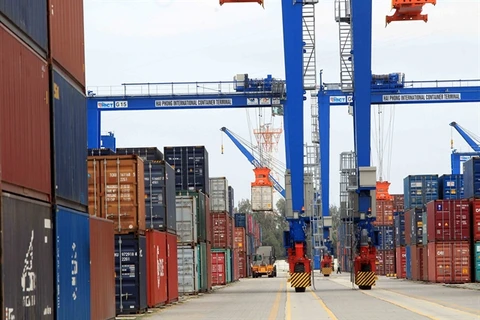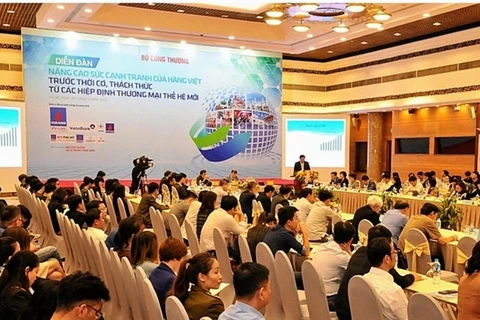 A petrol pump is being checked. Standards should not be considered barriers to export but the pressure to push enterprises forward in innovation and growth. (Photo: baochinhphu.vn)
A petrol pump is being checked. Standards should not be considered barriers to export but the pressure to push enterprises forward in innovation and growth. (Photo: baochinhphu.vn) Hanoi (VNS/VNA) - Careful consideration must be given to developing appropriate standards for enterprises to improve their product quality competitiveness in the context of rapid and intensive international integration, experts have said.
Standards should not be considered barriers to export but the inspiration to push enterprises forward in innovating and growing, especially after the European Union – Vietnam Free Trade Agreement (EVFTA) took effect.
Vo Tri Thanh, Director of the Institute of Branding and Competition Strategy, said standards were gaining increasing attention in Vietnam because of the importance to sustainable development and safety to human health.
For producers who wanted to expand in international markets, their products must meet standards and requirements set by not only international organisations, free trade agreements (FTAs) but also import markets, he said.
It was critical for enterprises to meet these standards and requirements to participate in the global value chains, he stressed.
For Vietnam which in the past lagged behind other countries in developing standards, he said it would take time for enterprises to improve their capacity.
A plan for developing standards must be developed clearly, Thanh said, adding that that outdated, infeasible and harmful-to-human health standards must be eliminated immediately while standards which related to technology renovation and for participation into the global value chains would take more time to meet.
In addition, he said penalties must be raised to prevent the abuse of standards, he said.
From the perspective of enterprises, To Hoai Nam, Vice President of the Vietnam Association of Small and Medium-Sized Enterprises, said there was reverse side of standardisation in economic activities.
In the domestic market, if the standards of a producer were selected to be the general standards for the industry or the national standard, it could become a barrier to other producers in the industry, he pointed out.
On the international scale, standard was also the biggest issue in bilateral and multilateral trade agreement negotiations. Standards were often used as barriers to prevent the flooding of import products which might affect domestic production.
Nam said that building standards required a comprehensive evaluation of the whole industry.
For export products, international standards must be taken into consideration when developing for Vietnam.
Standards must be developed for long term, Nam stressed, adding that changing practice would cause a lot of problems for firms because they must develop production plans and invest in science and technology to raise their game.
Caution was needed because inappropriate standards would hinder the development of enterprises while the good ones would promote quality and competitiveness, he said.
According to Nguyen Hoang Linh, Deputy Director of the Directorate for Standards, Metrology and Quality, firms should pay more attention to developing and applying standards in production and operation.
There were nearly 13,000 Vietnamese standards, around 60 percent of which are harmonised with regional and international ones.
Linh said that the focus would be placed on developing standards with environmental friendliness which would create an advantage for Vietnamese products to meet foreign markets’ demanding requirements.
Specifically, standards for new environmentally-friendly materials and energy would be developed together with standards for climate change response./.
VNA























